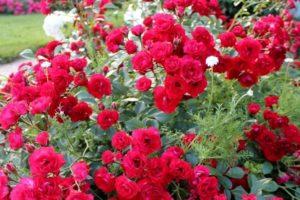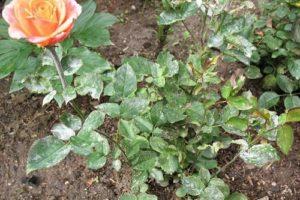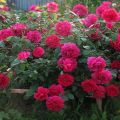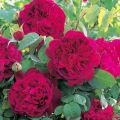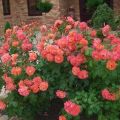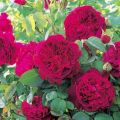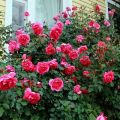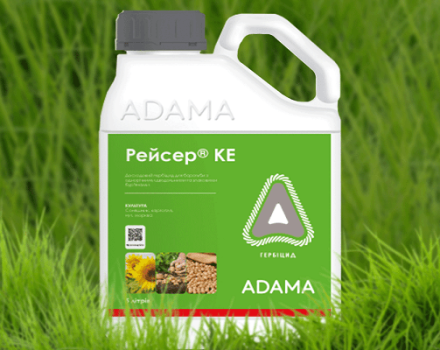Features of planting and caring for climbing roses in the Urals in the open field
The rose has long been considered a symbol of beauty and tenderness among many peoples of the world. Each variety is a unique color combination, but climbing roses will be a special decoration for flower beds and gardens. Usually, this term means several types of rose hips, as well as varieties of garden roses. Planting and caring for climbing roses in the Urals in the open field requires the gardener to follow certain rules.
Features of growing roses in the Urals
Everyone knows that growing any flowers in the Urals is not easy, as this region has a rather unstable climate. But in our time, breeders come up with many different hybrids, thanks to which gardeners have the opportunity to acquire a new collection of stunning flowers.
Rose is a plant that has many hybrids that can be planted not only in gardens, but also in parks and recreation areas. These flowers are great for landscape designers. Despite the ancient origin, new species appear every year, which allows organizing exhibitions and further developing the art of floristry.
In order to plant a queen of flowers, especially in this area, it takes a lot of effort. To begin with, take into account the climate and soil quality. The soil may be poor, so additional fertilization will be required.
Top dressing is an important part of plant life.
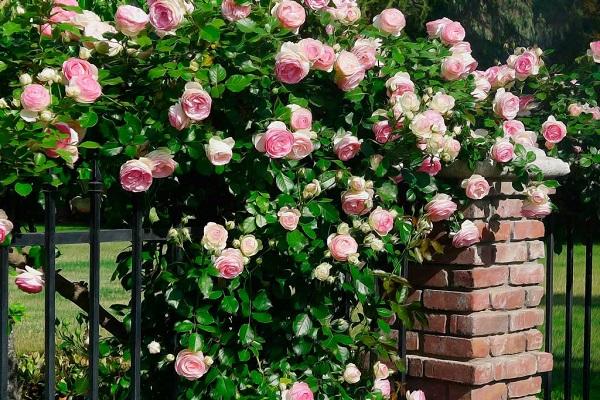
The best representatives of climbing roses for growing in the Urals
Climbing roses will not be easy to grow due to the harsh climate of the Urals. Therefore, not every hybrid is suitable for the gardener. For such a climatic zone, breeders have bred individual varieties of roses. For planting, plants are chosen that were previously grown in Siberian nurseries, in which the roses were hardened and trained, received the necessary complex of vitamins.
Canadian roses are considered one of the winter-hardy varieties, which are able to withstand negative temperatures and more easily cope with the lack of nutrients. Also used are varieties such as:
- Rosarium Uetersen;
- New Dawn;
- Golden Celebration;
- William Shakerspeare 2000;
- Prairie Joy;
- Golden Celebration.

Rules for growing flowers in this region
Before starting the planting process, gardeners should familiarize themselves with the characteristics of the different hybrids and draw up a growing plan for a successful operation and complete the process of creating an ornamental garden. The planting bed is prepared in the fall.
Landing dates
For planting, they choose the end of spring or the beginning of summer, the air temperature should not be less than 8-10 degrees above zero.
Location
The place is chosen elevated, but also protected from the wind, in order to avoid damage to young flowers by the wind. A sunny place is best, as well as an area near the fence.

The choice of planting material
The seedlings are soaked in water for 24 hours, after which they are slightly shortened. Cut off approximately 15-20 centimeters. Damaged or weak specimens are disposed of. Most often used seedlings from the store. They are more resistant to the environment.
Planting process
The next step is preparing the soil before planting. The soil should be loose, fertilized and drained. If the site is too poor, it is pre-fertilized. And also carry out additional dressing after planting.
For fertilization, humus, peat, wood ash, sand, clay are used, and also sawdust is additionally taken to loosen the soil around the bush. At the end superphosphate and potassium sulfate are added.
Dig a hole 50 by 50 centimeters wide. The soil is poured, the plant is placed in a hole. Make sure the roots are spread out. Once again, they are convinced of the quality of planting material. Sprinkle the planting hole and mulch the soil around.

The subtleties of caring for roses in the Urals
Gardeners take into account that the weather conditions in the Urals are very different from those in central Russia. Temperatures often drop below zero, so warming for the winter and loosening the soil is very important.
Watering and feeding
The soil is constantly maintained in a moisture-permeable state. Watering is carried out once every 7-10 days, if the soil is dry, a little more often. Young plants are fertilized only once a year. Most often these are potash fertilizers.
Mineral and organic fertilizers are also used starting from the second year after planting. In just a year, 5-6 dressings are obtained, but all types of fertilizers should be alternated. The older the bush, the more often organic substances are used, while removing mineral and potash.

Pruning shoots
First of all, they set themselves the task of forming a crown, since this type of roses is woven and requires formation. This is the key to successfully growing a healthy and robust plant. Also, when pruning, old and diseased branches are removed, which consume nutrients and slow down the growth of young flowers.
In summer, the trimmed parts will grow back very quickly, but this procedure also depends on the type of rose. There are hybrids that bloom twice a season, while others bloom only one. Side shoots lose their beauty in the 5-6th year after planting, so they are cut from time to time. The procedure is carried out in the same way as with raspberries.
Garter of climbing roses
In order for roses to become a good decor in a garden or gazebo, it is necessary to tie up plants or create supports. Decorative walls in the form of a grid or lattice are perfect for this. Supports are prepared from different materials, it does not matter, but they do not allow toxic substances.
Many gardeners use tall trees or fences as support. Basically, they tie up strong branches, while the young are given time to grow.

Features of preparation for winter
The area around the bush is covered with soil, and the shoots are kept completely above the ground. For preparation, time is chosen long before the arrival of frost. At the end of summer, watering of roses stops. Potassium fertilizer is applied to strengthen the stems. It is not always possible to make a shelter in a short time. Sometimes this procedure takes a week, but the result is worth it.
The temperature should be high so as not to damage the branches of the rose. In cold weather, there is such a risk. Several stems are tilted to the ground so that climbing roses will successfully survive the winter.
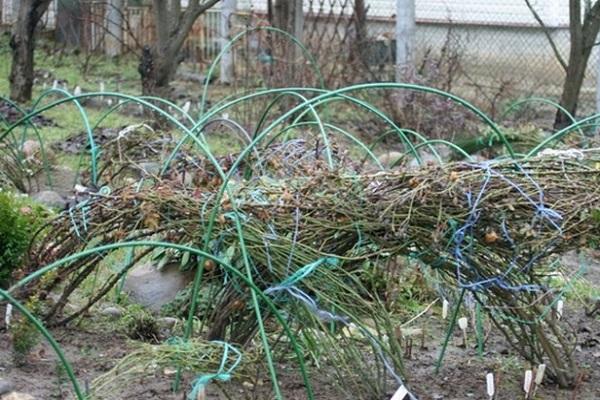
Cover the "construction" only with the arrival of frost. The base of the bushes is covered with sand or earth.In the Urals, a little more effort will be required; for this, a covering material or roofing material is placed on the roses. Another option would be to overlay the branches with spruce branches.
Typical errors
The formation of the bush should begin early so that the flowers sink to the ground, do not forget that climbing roses need support.
Do not cover branches if the air temperature is above freezing so that the plant does not start to rot.
For landing, choose a sunny day and a calm place. When pruning, 2-3 annual shoots are left. Pruning makes it possible to naturally select the strongest shoots.
